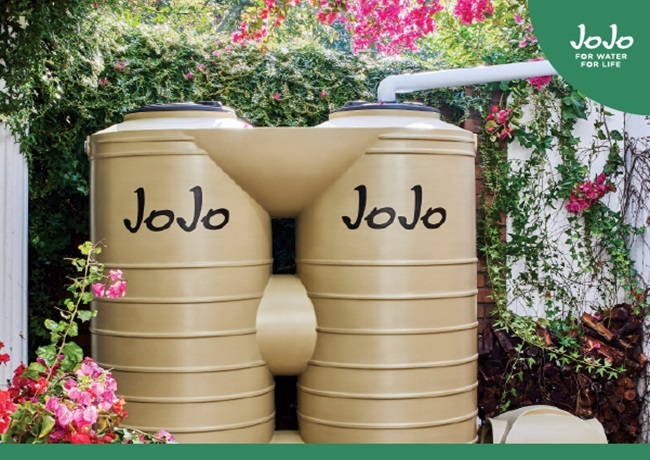
SPONSORED: #JoJoYourHome and effortlessly save water, money and the environment.
Water shortages and disruptions has an impact on every aspect of daily life - from cooking, cleaning and washing to flushing toilets. There are more and more urban environments where water disruptions are a regular occurrence.
In a world where living sustainably and caring for natural resources has become of critical importance, harvesting rainwater is a practical, environmentally friendly solution.
Have a look here at the benefits of harvesting rain, how much rainwater you can collect, and how to determine the number of JoJo tanks you need to maximise the advantages for your family.
The benefits of rainwater harvesting
When you harvest rainwater, you enjoy a host of advantages:
- Free and unlimited water supply every time it rains.
- Your roof gets a double function, because it becomes your main source of rainwater that can conveniently be stored in JoJo tanks.
- Filtration options means rainwater can be filtered before entering the tank, making it possible to render the rainwater drinkable.
- Even without filtration, the harvested rainwater can be used for the household’s other needs, such as irrigation, car washing, topping up your pool, and more.
- You always have a backup supply if municipal water supply is interrupted.
The amount of rainwater you can collect will depend on:
- The amount of rainfall your area typically gets;
- The rain catchment area (typically your roof);
- The size and amount of tanks you have available when it rains.
A quick calculation to figure out how much water you can get from your roof, looks like this:
1mm of rain on 1m2 of roof surface = 1 litre of water
However,it is not always this simple, as it is tricky to predict the amount of storage available at the time of rainfall. Between 10-15% of water will be lost due to gutters that overflow, splashing, evaporation, etcetera. But it can give you a rough idea of how much water you could potentially harvest.
Here's a practical example: If you live in Johannesburg, where the typical rainfall between October and April is about 680mm (or 0,68m) and you have a roof surface area of 100m², you could potentially harvest about 68 800 litres of water annually.
First, consider the following:
- What will you use the water for
- How much water does your household typically use?
For instance, if you use rainwater to wash your car once a week, fill up your fishpond once a month, and irrigate sensitive garden plants in the dry months, you need to ensure that your required amount of water is harvested and stored by the end of the rainy season so that it can carry you over until the next rainy season starts.
The most common mistake in unsuccessful rainwater harvesting systems is a lack of storage capacity. That is why it’s always recommended to get the most possible storage capacity that is practical for your setup and requirements. You could also start with one tank and gradually add more to increase your capacity. Rome was not built in a day!
By investing in JoJo Water Tanks and embracing rainwater harvesting, you not only secure a reliable water source, but also contribute to a sustainable, eco-friendly future. Download the JoJo DIY installation guide here:
https://www.jojo.co.za/wp-content/uploads/2023/01/TUIS-DIY-RWH-BBA_A4-Landscape.pdf
The guide is designed to be an easy weekend project, with easy to understand instruction.




 Publications
Publications
 Partners
Partners










